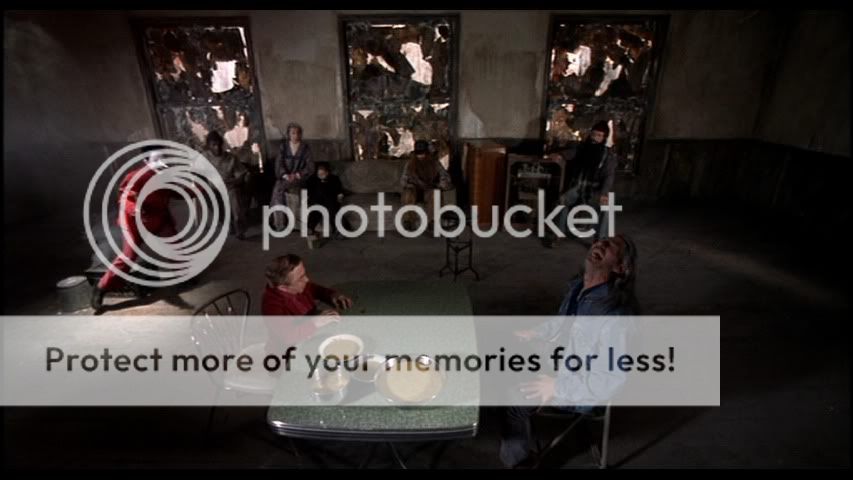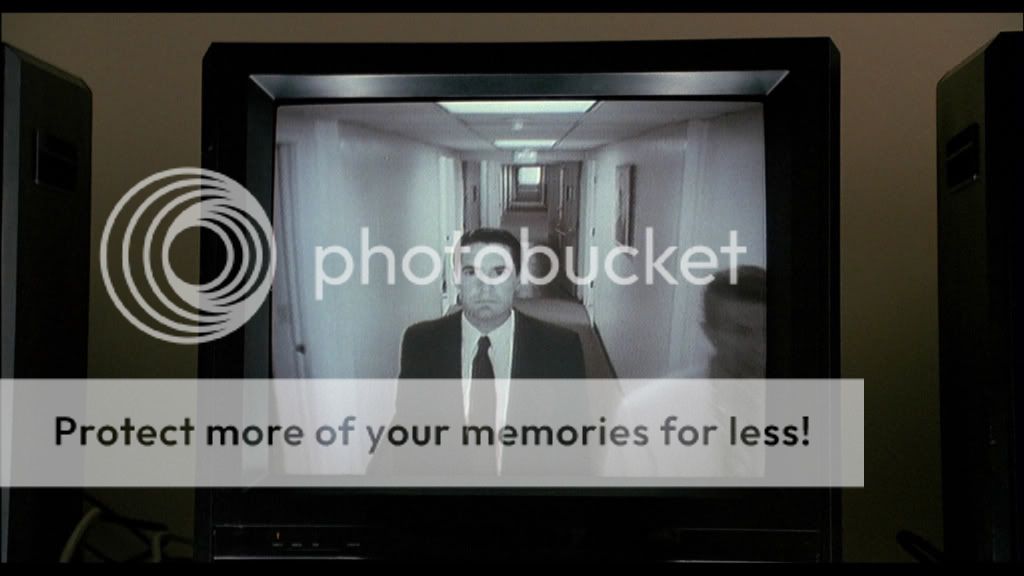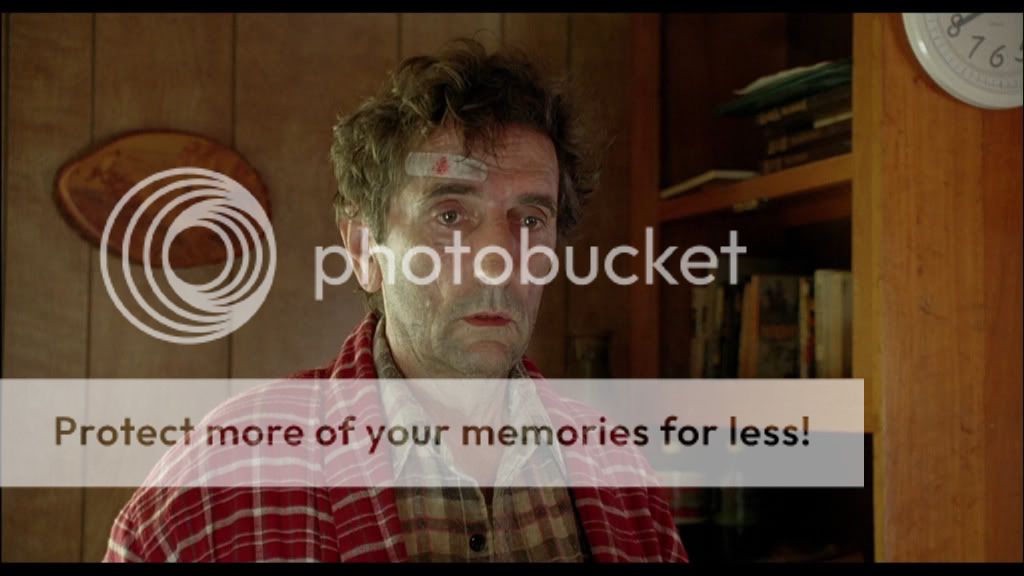Diminished capacity Golem-Coop somehow manages to be both maddeningly frustrating and joyously entertaining to watch at the same time. Frustrating because we are desperate for Agent Cooper to become his old, brilliant, sharp-witted self again and become a driver of the plot and action in the show once more. We miss his random philosophizing amid his summaries to Diane and his sharp deductions that he delivers as matter-of-fact asides.
Yet it feels like co-showrunners Mark Frost and David Lynch are taking an inhuman amount of glee at trolling the audience with this strangely bittersweet commentary on modern society in lieu of a decisive conflict between the Good and the Bad Dale Cooper. We instead revisit both Golem-Coop and BOB-Coop apparently still stuck out of phase with our reality, operating and interacting with the rest of the world on a different wavelength than normal.
This holding pattern in the story is terribly frustrating on a week by week viewing basis, yet this examination of how self-absorbed the people are in Dougie's life is darkly humorous and hard to stay entirely angry with. After all, one of the worst horrors is the existential nightmare of the people around you being too self-absorbed to notice the living hell you are living in. This most strangely surreal horror on the show so far is also oddly one of its most real horrors, too.
It feels like BOB-Coop may have created a near-perfect trap for Golem-Coop in the form of Dougie's banal life and disinterested sphere influence. A mundane world where no one much cares about anyone else.
I am reminded of Agent Cooper's monologue that he delivered to Agent Rosenfield about how every life has meaning in Twin Peaks, a way of life he worried had died out, but which was alive and well in that town. Well, we are not in Twin Peaks, but Las Vegas. And here life is treated cheap. Here Golem-Coop has a price on his head, probably by BOB-Coop. Mobsters beat their casino managers for high losses and showgirls watch on disinterestedly. And innocent and not-so-innocent bystanders get caught in the crossfire of BOB-Coop's war with Golem-Coop.
Even with building pressure to move the plot forward every week, Golem-Coop takes his time to do every task, descending deeper and deeper into Dougie's life with a Kafkaesque level of obliviousness from everyone around him. If life outside Twin Peaks is meant to represent what's wrong with big-city life, then Dougie represents the most middle-of-the-road and mediocre potential outcome of Cooper's existence. An investigative agent who does not close that many cases a month.
Some of the seemingly random threads from Parts 1-4 are slowly but surely starting to coalesce together, as the child of the drugged-out mother across the street from Dougie's rendezvous with Jade tries to fiddle with and remove the explosive device on Dougie's car. But a gang of car thieves beats the child to the punch and get crisped for their trouble. Clues for an investigator are starting to pop up everywhere now to help lead Teams Hawk and Cole to locate Golem-Coop.
Jade finds Coop's Great Northern Hotel Key and mails it off to be returned, which we assume eventually will help Team Hawk find Golem-Coop, hopefully. Please, let Coop's aimless wandering through life not last too much longer. Although there is something interesting about Cooper's predicament as Golem-Coop that relates to the original show and pertains to Deputy Hawk's heritage.
In the original run of Twin Peaks (1990-91), there is an important conversation between Agent Cooper and and Deputy Hawk at the end of Season 1 - Episode 03, which I refer to in my episode guide as Day 4: Laura's Funeral. After attending Laura's funeral, Agent Cooper and Deputy Hawk share a rare moment relaxing after work. Cooper takes this opportunity to learn more of Hawk's personal, native American beliefs.
videoz
videoz
Agent Cooper: "Do you believe in the soul?"
Deputy Hawk: "Several."
Agent Cooper: "More than one?"
Deputy Hawk: "Blackfoot legend. Waking souls that give life to the mind and the body. A dream soul that wanders."
Agent Cooper: "Dream souls.... Where do they wander?"
Deputy Hawk: "Faraway places. The land of the dead."
Agent Cooper: "Dream souls.... Where do they wander?"
Deputy Hawk: "Faraway places. The land of the dead."
This brief, private conversation between Coop and Hawk is very eerie in context of everything that transpired to Agent Cooper in Twin Peaks: The Return Parts 01-05. Agent Cooper's "dream soul" is apparently wandering in the land of the dead, in need of Cooper's "waking soul" to reinvigorate Coop's body.
With Major Briggs and Sheriff Harry S. Truman out of the picture, I think it will be up to Deputy Hawk to use his knowledge of Native American lore to help him find and restore Cooper's different souls back together in one body again.
And in fact, there's some deleted dialogue from that classic Season 1 episode featured in this article written a few years ago, in which Deputy Hawk has some interesting additional phrases of dialogue, inserting "Anywhere, U.S.A." between the lines: "Faraway places" and "land of the dead."
This seems particularly relevant since unlike the classic series proper in which we almost never left the town of Twin Peaks, in this iteration of the story we have spent considerably more time outside of Twin Peaks, traveling across the United States of America and the globe.
In The Return, we are literally visiting Anywhere the story takes us throughout the world. Almost as if this new iteration of the show is the Dream Soul of the town of Twin Peaks itself, wandering around until it finds its way back home. Just like Agent Cooper, we are drifting around looking for secure anchor points, unsure of where the flow of the story will take us.
One could definitely describe the strangely beautiful wasteland of the Casino that Agent Cooper wandered as he became Mr. Jackpots as a land of the dead, especially as you see the grim specter of the old woman haunting the slot machines looking for a lucky break.
And apparently, Deputy Hawk's understanding of the nature of the soul as he understands it from his Native American Blackfoot heritage will play a key role in locating what is missing, something to do with Agent Cooper. Margaret's log said so, after all. And we have no reason to doubt the truthfulness of her log after it has proven to be such a reliable testator 25 years ago.
Perhaps this seemingly random journey we are on with Cooper has more meaning than at first glance. Maybe to better understand Cooper's point of view, we are shown this juxtaposition of two worlds in America, the dream suburban home life of Dougie contrasted with the drugged out mother and her son, the beauty of the lights, luxury, and glamor of the casino contrasted with the threats and mob violence, the common office workplace of the insurance company contrasted with the desperate hitmen apparently hired by BOB-Coop who are trying to hunt down and kill Golem-Coop (or Dream Soul-Coop).
As we walk through Agent Cooper's point of view as he roams in and out of these various contrasts, we better understand why he appreciates and loves the town of Twin Peaks as much as he does. Twin Peaks at its best represents the antithesis of that duplicitous world. And as the Dream Soul-Coop makes his way out of the world of darkness and decay, as presented in the Las Vegas segments, we can feel relief right along with his character as he one day returns to the open arms of the people of Twin Peaks.
This episode in particular juxtaposes the glitter and glitz of the Casino with the drugged out mother and her son, or a busy group of people going about their lives failing to recognize a heroic FBI Agent in trouble, needing help. The Return might have some aspirations to reunite the fractured soul of the nation, just as we look for ways to reunite Cooper's fractured psyche back together again. And along the way, find that Twin Peaks-ian way of life that Cooper was once worried might not exist any longer.
As we walk through Agent Cooper's point of view as he roams in and out of these various contrasts, we better understand why he appreciates and loves the town of Twin Peaks as much as he does. Twin Peaks at its best represents the antithesis of that duplicitous world. And as the Dream Soul-Coop makes his way out of the world of darkness and decay, as presented in the Las Vegas segments, we can feel relief right along with his character as he one day returns to the open arms of the people of Twin Peaks.
If this is in fact an 18-part feature film, as David Lynch posited, then we are still firmly rooted in Act One, so it is premature to make any supposition or speculation about where we are ultimately heading, but I have a feeling it will be a place both wonderful and strange.
We are still on an introductory tour of this new Twin Peaks series, still making the rounds and getting to know our new characters and story world and how the old characters and story world have changed since we last saw them 25 years ago. And I suspect the big inciting incident that will sling shot us through the rest of the story is about to take place.
Although these 18 parts are intended by Mark Frost and David Lynch to represent one, extended feature film, the programming reality is that we are limited to watching only one part every week for the next three months. That is not to say that we do not love what we get, but only that the typical viewer is going to have a hard time juggling all these characters and story lines from week to week.
Again, I would normally not complain about the weekly wait, since that has been the nature of TV programming for several decades now. But given that Twin Peaks: The Return (2017) was specifically designed and plotted by Mark Frost and David Lynch as one extended feature film experience, then I would point out that most of the audience probably would be more satisfied watching it straight through as a feature film, too.
We will just have to be patient for now and not get too carried away until a more significant chunk of the story is revealed over the next several weeks. The chances of Showtime listening to the viewers and shifting their release schedule around is probably slim to none. And if Mark Frost and David Lynch prefer this periodic release schedule, then more power to them. But it is still worth pointing out to number crunchers who have been scratching their heads why Twin Peaks: The Return has not skyrocketed yet to huge mainstream viewership yet. I suspect most people are waiting to binge it later.
A part of me wishes Showtime would just release the 18 parts of this season all at once, as has become common practice with Netflix. Honestly, Netflix kind of spoiled all of us to the inch-by-inch plot reveal of weekly episodic television, especially when it comes to a hyper-serialized show such as Twin Peaks: The Return (2017), which David Lynch has gone out of his way to make a point to say that he specifically designed it to feel like one extended movie experience, rather than a typical season of individual episodes of a TV show.
I will point out that some of the low ratings reported on these last few weeks were not properly taking into account streaming video plays, nor the fact that Showtime's subscriptions skyrocketed through the roof leading up to the release of the new Twin Peaks. But honestly, when given a chance to view the original Twin Peaks, most people are going to choose to watch more than one episode per week. So why would people act any differently with this new series?
People have been scratching their heads the past few weeks why Twin Peaks: The Return's ratings were a little disappointing, and I believe the answer is as simple as most new and casual viewers of a new show favor waiting until a season of programming is over so they can binge watch it at their leisure later.
Only the most hardcore and devoted fans are going to follow the show in its original run, pouring over every detail of it for these first four months. People generally lead busier lives today than they did 25 years ago. Convenience in viewing has become the new standard.
Back in the early 90's, you basically had to watch week to week because you would miss out on the show entirely if you did not. VCR's were just beginning to gain in popularity back then as an early Tivo-like device and most viewers were not recording very much television for later repeated playback. You either watched it when it aired, or you did not get to see it until a rerun.
And back when the show was a major cultural milestone, the chance of people getting spoiled about Twin Peaks back in the early 90's was far higher than it is today, while the show has moved from ABC to Showtime. The show's spread and reach is greatly limited by how few people have cable or satellite and a premium subscription to Showtime.
Most people either cannot afford a Showtime subscription, or would rather use their money for other things and simply wait to buy this new season of Twin Peaks on UHD or Blu-Ray, or buy the episodes together in bulk off of a streaming service once the series is complete. Most people are watching so many shows that the idea of waiting week to week for new episodes no longer has any appeal for them.
People have been scratching their heads the past few weeks why Twin Peaks: The Return's ratings were a little disappointing, and I believe the answer is as simple as most new and casual viewers of a new show favor waiting until a season of programming is over so they can binge watch it at their leisure later.
Only the most hardcore and devoted fans are going to follow the show in its original run, pouring over every detail of it for these first four months. People generally lead busier lives today than they did 25 years ago. Convenience in viewing has become the new standard.
Back in the early 90's, you basically had to watch week to week because you would miss out on the show entirely if you did not. VCR's were just beginning to gain in popularity back then as an early Tivo-like device and most viewers were not recording very much television for later repeated playback. You either watched it when it aired, or you did not get to see it until a rerun.
And back when the show was a major cultural milestone, the chance of people getting spoiled about Twin Peaks back in the early 90's was far higher than it is today, while the show has moved from ABC to Showtime. The show's spread and reach is greatly limited by how few people have cable or satellite and a premium subscription to Showtime.
Most people either cannot afford a Showtime subscription, or would rather use their money for other things and simply wait to buy this new season of Twin Peaks on UHD or Blu-Ray, or buy the episodes together in bulk off of a streaming service once the series is complete. Most people are watching so many shows that the idea of waiting week to week for new episodes no longer has any appeal for them.
Perhaps Showtime might consider adjusting their release schedule slightly to account for the Netflix effect? Maybe Showtime could release the first nine episodes in bulk? Then wait a couple of months for us to process all that material and release the remaining half of the eighteen parts? Twin Peaks: The Return is such a different kind of show than anything else that I suspect we need a different way of presenting it to more quickly recapture the public's attention.

After all, with Netflix's House of Cards, Daredevil, Jessica Jones, and Stranger Things, people were excited to be able to absorb a large portion of these unique story worlds, characters, and plots all at once. In particular, the most Twin Peaks-like show on Netflix's schedule, Stranger Things, would have probably suffered from a weekly episodic release schedule.
Rather than an exciting 8-hour rollercoaster ride of twists and turns, Stranger Things may have come across as too frustrating and slow as you force the audience to watch the 8-episode first season over a course of two months rather than in two nights, which was the most common way to view it by most people. Weekly episodic Stranger Things would have also come across a little more confusing and harder to follow, too.
I suspect a similar problem might be at work now with modern TV audiences, who Showtime is expecting to watch and follow a single 18-hour film spread out over the course of four months as if it were a typical episodic TV series, which it is clearly not. After all, we would not be so frustrated as an audience of being introduced to a new character like Steven if it did not mean that we are robbed of seeing old fan favorites again, like Audrey Horne (Sherilyn Fenn) or Big Ed Hurley (Everett McGill) for potentially several weeks more.
Honestly, a month ago, fans of the original show thought we would be all caught up with our favorite characters by now and be zigzagging across their personal lives throughout every episode on a brand new adventure that interconnected and crossed over everyone's lives. As is, the weekly release makes the core audience feel like we are just being thrown the occasional bone by getting a glimpse of the original denizens of Twin Peaks in brief spurts and cameos, like Mike Nelson's fun cameo as the middle-management hiring agent who is thoroughly unimpressed with Steven's resume.
As fun as it is to see Mike still being the same old asshole as he was in high school, it is a little crazy-making to have to watch this scene play out rather than catch up with the formerly central character of Audrey Horne yet again. And we have not seen a single scene of the Bookhouse Boys trying to induct a new member into their ranks to fight the evil in the woods. Instead, we are forced to watch Dr. Jacoby (Russ Tamblyn) literally spend 10 minutes prepping, spray-painting, and selling his gold spades to literally shovel shit on screen instead.
And again, I actually love this insane side plot of the eccentric internet sensation that is the cranky crackpot "Dr. Amp" formerly known as Dr. Jacoby (Russ Tamblyn). His pirate vlogging is an insane thing of beauty to behold. This gold shovel marketing infomercial is one of the funniest and most absurd things on the show so far. But when we know a scene like this is literally costing us a reunion with the likes of Audrey Horne and Big Ed Hurley, the show is slowly driving classic Twin Peaks fans a little mad in the process.
In the back of our minds, we all know we will now have to collectively wait several weeks longer before we will even potentially get a chance to revisit any of those favorite characters again. It is enough to make us in the audience a little more resentful than we ever wanted to be while watching this brilliant programming. Even a comedic gem like this scene can be frustrating for the audience. Again, no Audrey and no Big Ed for us because we had to watch Dr. Jacoby's apparently pointless infomercial this week instead.
It is fun to see some of the old gang again, but when we are literally given two reaction shots to reintroduce us to Nadine, again we feel disappointed. The last we saw of Nadine, she was going through a crazy identity crisis while wrestling with super-human powers. Getting two brief reaction shots of her watching Dr. Amp (Jacoby) is amusing, but terribly frustrating for us wondering if she ever got her act together. Inquiring minds want to know! Has she become the sweeter version of herself? Or is she still the crazy, bipolar menace who crushes grown men with her bare hands?
Now in Part 05 we finally get to revisit Norma and the Double "RR" Diner, but I cannot be the only one feeling a little disappointed that no one in The Return has yet to eat a single cherry pie on screen, nor have they effused praise on Norma's cooking abilities. There is something missing here, people! Bring back the pie!
For anyone who might think otherwise, I absolutely love every minute of Twin Peaks: The Return (2017). It is a remarkable work of art that we have only scratched the surface of so far. Any issue I have now might evaporate away by the time we reach the final episode of The Return.
These are not even really complaints about the show itself, as much as it is about objecting to the unconscionable torture of the audience with its slow, weekly release schedule in a day and age where such things have become unnecessary. Maybe they could at least continue giving us two hours of Twin Peaks per week, Showtime? Pretty please with whipped cream and a cherry on top?!
One hour once a week was ok back when the show was episodic and designed to please an audience in each installment. That is not the case with this iteration of the show. It is not episodic and is just a very long first act of a three act 18-hour movie. Please excuse me for sounding repetitive on this point, but few things feel more frustrating than prolonging and stretching out this Twin Peaks movie's presentation arbitrarily.
Mark Frost and David Lynch already purposely designed this particular story to be a little difficult to engage with in the first place, but add on top of that a months-long wait to catch up with most of the core characters of the original show, and a mentally incapacitated central character in Agent Cooper, and I am afraid it could be the straw that broke the camel's back for most casual Twin Peaks viewers until binge season arrives at the series end.
I believe you will see far more viewer satisfaction and much higher ratings and streaming numbers if Showtime will just bite the bullet and release the series en masse, as Netflix and Amazon Prime have paved the way before them to do. Then you will get a lot of buzz on what is surely going to be a satisfying journey rather than endless speculation about how the show might be fully satisfying again someday after several more weeks or even months of meticulously slow viewing.
I think there is a degree of fatigue in hearing podcasters and YouTube commentators simply repeat how confused they are currently and how it is too early to tell what is really going on in this show yet. I feel we the audience need more significant chunks of story and character development to chew on and savor than 1/18th of a movie once a week.
I know I am being hyperbolic on this point, but honestly, live viewers are going to be in for a frustrating four months as we continue to be introduced to new characters we do not yet care about, knowing it takes away precious screen time from the old characters we do care about. Showtime, David Lynch, and Mark Frost, is it not a little cruel to dangle an extended Twin Peaks feature film in front of us, just to release one piece of its jigsaw puzzle only once a week?
I logically know Showtime is highly unlikely to expedite their viewing schedule, but really, if they would I think even more people would be excited to watch week to week and would continue hopping on this Twin Peaks train faster than they are currently. Twin Peaks: The Return is actually a great new story, but so far, this slow trickle of a release is just making everyone work extra hard at absorbing a story that is already densely layered and complex.
Honestly, I have some family and friends who are on the fence right now and who seem about ready to check out of live viewing of The Return altogether and just wait until the whole 18-part season has been released before they continue watching it again. And it is getting a little harder for me to persuade them to do otherwise without a significant upheaval to the show's currently deliberate pacing and frankly depressing tone.
It is a little difficult to keep a crowd of viewers excited when our hero acts like he suffered a stroke and is ending episodes by standing aimlessly next to statues. It is not the typical crowd-pleaser cliffhanger that keeps us on the edge of our seats for more. I know we need to be patient and just wait for the story to unfold, but honestly, a lot of us viewers are missing the old town of Twin Peaks and it is a little painful when you only get a few glimpses of it each week.
On the other hand, I am just happy to have the new Twin Peaks at all, so I am not going to complain. I consider myself and all of us extremely lucky to get any additional Twin Peaks to any partial degree right now, but I know others who are struggling a bit with the show. It is worth mentioning and offering up some potential fixes, as unlikely as it is that anyone is really listening.
The whole series will finish playing out in full after four months total. After that, the whole series will be available and this whole issue will be a moot point anyway ever after. The slow release and slow pacing will not matter starting in September, but the magic of Twin Peaks's return will forever remain with us. I am grateful and very happy to be here and see this unlikely day arrive. I will not let any temporary issues or gripes ever clog up my weekly joy at discovering what happens next in my favorite fictional town, Twin Peaks.
But please, please, please give us back Audrey Horne. We know she is going to be in it eventually. Please do not make us wait weeks/months for her needed presence. The last we saw her, she was tied up to a bank vault that was subsequently blown up. On behalf of Twin Peaks fandom, we request visitation rights. We need to see her and know she is ok and going to have some significant part to play in this new show, and not relegated to a one off cameo.
Excuse the tangential rant on the problems of a weekly release, but if Twin Peaks: The Return was not intended to be far more satisfying to watch in a single, long binge-watch, then I do not know what show is. I would much rather be discussing the show, but honestly the show is still in an introductory holding pattern this week. Some new pieces are on play on the board but the key pieces like BOB-Coop and Golem-Coop--or perhaps we should call him Dream Soul-Coop now--are still exactly where we left them the week before.
We hope that Room 315 key makes its way back to the Great Northern and gets placed in the hands of the Sheriff's Department sooner rather than later. We want Team Hawk and Team Cole to unite law enforcement forces with the Air Force Special Investigator's office and get something done! We need Deputy Hawk to figure out how to restore Agent Cooper's souls/doppelgangers back together again sans BOB and see our very Special Agent return to the active protagonist role once more.
For all the screen time Kyle MacLachlan has had on screen so far, we still have not had the real Agent Cooper back yet on the show. We glimpsed him in a daze in the Black and White Lodge, but honestly, we need to see our sharply dressed, Holmsian detective back in action, making progress on a case once again.
There are some interesting characters and moments in this episode I would have liked to discuss more, but honestly, all we know is that a guy named Richard Horne likes to terrorize teenage girls at the Roadhouse. Is he the son of Audrey? I hope not. He definitely seems to take after Ben and Jerry Horne more, so there is a possibility one of the Horne brothers sired this new monster into existence late in life.
It could help explain how Richard could end up such a gleeful, sleazy reprobate. The Horne brothers did own and frequent an illegal casino and brothel in the classic series. The chances of them neglectfully failing to raise a son seems far more likely than Audrey being his mom.
Even with all of Audrey's bravado, she was a caring and nurturing sister to her brother Johnny and she would have likely been an excellent mother to any of her potential children. That's not to say the best of parents cannot occasionally get a bad seed, it's just slightly less common.
I suppose Johnny Horne might have had a child, too, although the last we saw him, Johnny had the mental level of a toddler still. Things change though and Johnny might have matured and snapped out of his disorder, similar to how Ben Horne snapped out of thinking he was General Robert E. Lee.
All I know is that the Horne family does seem to have a history of some craziness in the men of their family, so this Richard Horne punk makes some sense, although the severity of his creepiness and harassment is definitely on a whole new level. I would not be surprised at all if Richard Horne is destined to be one of the potential big bads of the new cast. Although a change-of-heart arc could be interesting to explore with him, too.
Richard Horne seems to have been raised without discipline or a moral compass of any kind. I definitely lean with him being either Ben or Jerry's son, though. That seems more likely to me, but anything is possible. All I know is if there are any Bookhouse Boys worth their salt, then Richard Horne is going to get a serious ass-kicking soon if he does not cut out his aggressive, rape-like behavior.
It is worth pointing out that when Cooper was speaking to the Giant in the black and white book end scenes of Part 01, the Giant did mention something about a Richard and Linda.
The Giant, "Remember 430. Richard and Linda. Two birds with one stone."
Cooper, "I understand."
It seems possible that Agent Cooper in his ethereal Lodgian soul state is acting as a guardian angel of some kind, looking after Richard and Linda. It is possible that the mystery character that Jane Levy plays is named Linda, explaining why Jane Levy was not included in the end credits for the episode, nor is she listed on IMDb's cast list for the episode either. David Lynch has gone to some trouble to keep her character name a show secret for the time being. Is Richard Horne the Richard in question?
If Jane Levy is indeed playing the Linda mentioned in the opening black and white prologue scene, then what importance will she play? If you ask me to make an educated guess, I would suspect Linda is a Hayward, perhaps Donna's or Gersten's daughter? Gersten's hair is much more similar to potential-Linda's, so I am leaning with that connection.
If true, I look forward to getting a scene with Alicia Witt reprising her role as Gersten, either as Linda's mother or aunt. There is a bit of a family resemblance between the two characters. If Alicia graces us with more of her piano playing at a Hayward get together with Warren Frost and Mary Jo Deschanel in a future scene, then I think I might just melt with nostalgic euphoria and stop crying over our weekly tantalization for the next segment of The Return to play. Call it fan service if you want, but that warm and inviting Twin Peaks we all know and love is still waiting for us to rediscover it.
Is black and white Lodgian spirit Coop keeping Richard and Linda under observation for some reason? Mike, BOB, and the Giant spent many years preparing human vessels for them to possess over time. Is something similar being done to Richard and Linda? What does the number 430 signify? Why were Cooper and the Giant apparently afraid of being overheard by someone else? What is so secret about this information? And who is potentially eavesdropping on them and why? And why do I have a feeling it will be at least two months before we find out any answers to any of this?
Ok, I saved the best for last because, honestly, this is going to rock our collective Twin Peaks-watching world! A quarter century ago when Mark Frost and David Lynch first co-created this show, they established certain hints that the entities who live above the convenience store and the entities who populate the white and black lodge and waiting room can travel through electricity.
We began with subtle hints and close-ups of the Palmer household's electric hallway fan. This is a recurring motif that happens a surprising number of times throughout the series and later with great effect in Fire Walk with Me (1992). The spinning of the fan seems to preface BOB teleporting into Leland Palmer and taking over his body.
Then we start getting weird electrical glitches in the lighting fixtures around the body of Laura Palmer in the hospital's morgue. The morgue technician attributes it to a bad transformer, but the blinking lights seem to follow the Lodge entities wherever they go. If you look for malfunctioning lights that blink throughout the series, prequel film, and now in The Return (2017), then you will notice blinking lights tend to be left in the wake of the Lodge entities and their human vessels they recently interacted with in our world.
This tie-in with electricity is so detailed and repetitive that it would take a whole article just to list all the occurrences where it plays an important role in foreshadowing contact with the Lodge entities, such as Mike and BOB. Even inside the waiting room, black lodge, and white lodge, there is a great deal of electrical activity hinted at.
We encounter strobe-lighting effects, implied electrical bursts when Agent Cooper enters the Lodgian realm in the classic Season 2 Finale, shortly after he had traveled through the gateway in Glastonbury Grove. Interestingly, similar lighting effects did not accompany the possessed Leland when he walked in through the same portal at the end of Fire Walk with Me (1992).
In Fire Walk with Me, BOB apparently literally talks to Laura Palmer through the electricity in the hallway fan and tells Laura he wants to make her body his own. In retelling the event to Harold Smith, she makes it clear that if Laura does not allow BOB to take over her body, then he will kill her. And then later in the film, when she finally realizes who the human vessel is that BOB has been using to rape her, we see the same hallway fan in frame as she holds on to and retains that elusive truth, finally.
And then later in Part 02 of The Return, Mike's arm transforms and evolves into a sycamore tree with a brain on top that sparks and pulsates with electrical impulses throughout its trunk and branches. We may be tempted to call him Braintree from now on, but we should remember he is The Arm, which is the equivalent of the dwarf from Agent Cooper's original dreams and visits to the lodges. And watch out, Braintree has an evil doppelganger out there causing mischief, too.
The implication from this scene is that the Lodgian entities who inhabit the various lodges can enter our world through different portals via conduits of electricity. At one point, David Lynch even takes us on an extreme dolly in, zoom in, close-up inside the mouth of a lodge entity as he says, "Electricity." And Agent Cooper's strange interaction where the apparently teleported Agent Phillip Jeffries (David Bowie) from Buenos Aries into Philadelphia was accompanied with a great deal of electrical sound effects, the same for when Jeffries mysteriousoly disappears after his confusing scene of dialogue with Gordon, Albert, and Dale.
Back in Fire Walk with Me, we first encountered Harry Dean Stanton's character Carl Rodd managing the trailer park where murder victim Theresa Banks was killed. We get a lot of strange electrical sound effects in the trailer park and Carl at one point breaks down in tears and says, "I've already gone places. I just want to stay where I am."
It is implied that Carl Rodd has been abducted via the electrical power lines at the trailer park. Similar abductions apparently occurred to the Log Lady and Major Briggs before or during the original series. In the case of Major Briggs's abduction, his disappearance was accompanied by a huge burst of light in the woods, again hinting at electrical involvement of some kind.
It would appear that sometimes people can be bodily transported from one location to another via power conduits and outlets. In fact, the strange glass box in New York seems to have been set up to temporarily capture people and items traveling along these conduits and perhaps directing them elsewhere along their course.
While the mechanics of it are still a little fuzzy, it is clear that the Lodge entities seem capable of living, traveling, and operating within our power grids. They use our power lines to travel between different points on our world, and also between different worlds entirely. Whether they simply live on another plane of existence of planet Earth itself or not, it is hard to tell yet. But we finally have the clues we need to unlock the most shocking moment of tonight's episode.
BOB-Coop is currently in a federal prison in South Dakota. I personally think this is part of a plan to extract intel from Ray, the slime-bag with Darya who apparently messed up and was sent to prison. But regardless of the reason why he is there, BOB-Coop seems to be in control of the prison's electrical systems when he places a call to Buenos Aries, Argentina.

Whatever that small black box in Argentina was, it seemed to give BOB-Coop the ability to overload the Warden's monitors, security systems, and communications. And based on BOB-Coop's expression of complete control, it would seem he now has control over the electrical systems of the prison.
Interestingly, Mark Frost and David Lynch left clues over a quarter of a century ago that these evil lifeforms could manipulate and control electrical forces. And ironically, 25 years later, our entire society has been completely infested with electronic devices that occupy a great deal of power and influence over our waking lives.
From cell phones, to tablets, laptops, and desktops, computers are embedded into every facet of our lives. The electronic superhighway as it has been termed in decades past, the internet connects nearly all humans across the entire world now. A thought, a word, phrase, document, book, or volumes of texts can be transported instantaneously across the globe at the blink of an eye.
And interestingly, BOB-Coop has been shown to be exceptionally computer literate, hacking into the FBI database in episodes past to determine where Ray was being held. BOB-Coop knows his way around our GPS, electronic mapping systems, and can apparently get to anyone he wants to and perhaps take control of their electronic devices, including modern day cars that have a tremendous amount of hardware and software to manipulate.
BOB-Coop's full capabilities are not yet known, but he might be able to cause a plane or a car to crash from thousands of miles away with just a few keystrokes. The capacities of BOB and his kind are still unknown, but the good news is that a side effect of BOB and Cooper's doppelganger possessing Agent Cooper's body for so long is that it seems to have bled many Lodgian powers and abilities over to Agent Cooper proper, too.
This would explain why Golem-Coop seems to have a new sixth sense that reveals lucky jackpots or can let him know when someone is lying or not. If the various parts of Agent Cooper's soul can be put back together again, I have a feeling Agent Cooper is going to be the most formidable opponent of BOB in the human world.
Interestingly, that Voldemort to Harry Potter analogy I came up with in the last episode discussion seems to be holding true. BOB has unintentionally marked Agent Cooper his equal by possessing his body for 25 years. And just as Harry Potter gained the powers and abilities of Voldemort, like parsel tongue, so too does Agent Cooper seem to be imbued with special magical abilities. And "neither can live while the other survives."
So it would seem Mark Frost and David Lynch have set up a perfect enemy to humanity, one that can control us through our televisions, fans, air conditioners, power tools, laptops, and phones. BOB, the evil that wants to overwhelm and corrupt men's hearts and feed off of the pain and suffering of humanity now have a world ripe for the picking 25 years later. Is the Lynch/Frost duo prescient? Maybe. But the war for man's souls is being waged online now, too.
And given the widespread epidemic of trolling on the internet nowadays, one could make the argument that BOB and his evil Lodge cohorts are having a very successful time spreading their evil and hatred across the globe on a massive scale now. Perhaps they wish to prepare all humans across the world to be their vessels for potential possession. This could be the most insidious alien invasion story conceived yet.
I wish we could binge-ify this show already! Until then, I am your faithful companion in helping make these week to week airings a little easier to watch and hopefully understand. Together we can absorb the whole story a little better and fall back in love with Twin Peaks all over again.






















































































No comments:
Post a Comment